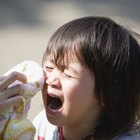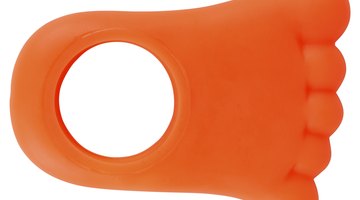Teething and a Sore Throat
Teething is an obviously painful stage of development for babies and toddlers. The pain of teething may precede the actual eruption of the teeth for days or weeks. This can confuse and unnecessarily worry parents. Their baby or toddler is in obvious pain, but there is no evidence of anything out of the ordinary. In some cases, parents may suspect the baby or toddler has an ear infection or sore throat. In some cases, sore throat and ear discomfort may indeed be part of the child’s teething process, though it is rare.
Monitoring Saliva
If there is no evidence of a tooth coming in, a telltale symptom of teething – aside from constant crying – is excess saliva. In addition to producing more drool, the child may seem to be suffering from a cough or chest congestion. Additionally, the child may develop a chin rash consisting of small red bumps. This rash is caused by the saliva and can be alleviated by frequently wiping the corners of the child’s mouth. Since babies can start cutting teeth as early as 4 or 5 months of age, teething is often overlooked as a viable cause for the child’s discomfort.
Ear or Mouth Pulling

Side Effects of Teething
Learn More
Many parents are alarmed when a baby begins to pull at her ears. They immediately presume the child has an ear infection and race to call the pediatrician. While it is wise to call the pediatrician when a child begins to exhibit odd behavioral patterns, ear pulling is generally symptomatic of teething pain. Pulling the ears helps the child alleviate some of the pressure shooting through the gums. Likewise, if the child is pulling at her mouth or gums, it is a good indication of teething pain. A better indication of an ear infection is sudden lethargy and the refusal to lie down on a particular side. This behavior merits an immediate call to the pediatrician.
Cold-Like Symptoms
For some babies and toddlers, teething is accompanied by cold-like symptoms. These symptoms can include a runny nose, chest congestion and coughing. If these symptoms are accompanied by a low grade fever of 101 degrees Fahrenheit, call the pediatrician. These cold-like symptoms are generally caused by excessive hand-to-mouth contamination stemming from the child touching or grabbing his mouth or gums. If the cold-like symptoms persist for more than three days, call the pediatrician.
Sore Throat

Mouth Pain in Children
Learn More
Though it may be difficult to see, if the baby or toddler has a bright red throat, she may indeed have a sore throat. Generally, a sore throat is not symptomatic of teething. That being said, if the child is prone to cold-like symptoms while teething, she may have developed a sore throat as a result of a bacterial infection. If the child’s breathing is irregular or if her throat is flecked with puss or swollen, call the pediatrician immediately. Furthermore, if the child is running a fever of 101 degrees Fahrenheit or higher call the pediatrician.











